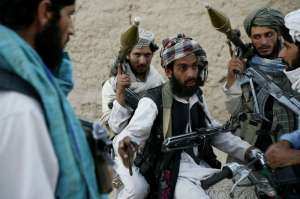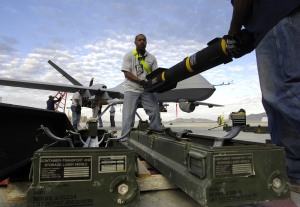
What if the United States has been waging the wrong war against the wrong enemy for the last 13 years in Afghanistan?
Pulitzer Prize-winning New York Times journalist Carlotta Gall, who spent more than a decade covering Afghanistan since 2001, concludes just that in her new book, “The Wrong Enemy: America in Afghanistan, 2001-2014.”
Gall told “On the Radar” that Pakistan – not Afghanistan – has been the United States’ real enemy.
And while Gall’s “book” might be easily dismissed as irrelevant warmongering, it echoes a narrative that was crafted by some of the most notorious policy makers in the US and promoted widely in 2011 across the Western media. This included the BBC’s documentary, “Secret Pakistan,” from which it appears Gall is deriving her premise.
“…the real military threat is the Taliban – a serious insurgency that’s got nothing to do with Bin Laden. Bin Laden, in operational terms, is utterly spectacularly irrelevant.”
The next important quote comes toward the end of the documentary where former CIA officer and current fellow at the corporate-funded think-tank, Brookings Institution, Bruce Riedel (57:35) claims:
“…there is probably no worst nightmare for America, for Europe, for the world in the 21st century than a Pakistan that is out of control, under the influence of extremist Islamist forces armed with nuclear weapons.”
War With Pakistan

The most overt example comes in the form of nearly a decade of deadly US drone attacks carried out in Pakistani territory. These attacks have led to over 3,000 killed, a quarter of which have been civilians, and constitutes an act of war no other nation on Earth would tolerate. While the US claims these operations are “anti-terror” in nature, they appear to be instead a component among a much greater campaign to undermine and destabilize Pakistan politically.
Other components include the direct US support of separatists in Pakistan’s Baluchistan province. Baluchi terrorists straddle the Iranian-Pakistani border and have long been considered by the West as armed proxies of great utility.
In Seymour Hersh’s 2008 article, “Preparing the Battlefield,” US support of Baluchi groups operating against Tehran is reported as already ongoing. As already mentioned, in Brookings Institution’s “Which Path to Persia?” the subject of arming and sending Baluchi insurgents against Tehran is also discussed in great depth.
The 2006 Carnegie Endowment for International Peace report makes special note of the fact that above all, the Baluchistan province serves as a transit zone for a potential Iranian-India-Turkmenistan natural gas pipeline as well as a port, Gwadar, that serves as a logistical hub for Afghanistan, Central Asia’s landlocked nations as well as a port for the Chinese.
More recently, longtime proponent of a Baluchi insurgency in Pakistan, Selig Harrison of the corporate-funded Center for International Policy, has published two pieces regarding the “liberation” of Baluchistan itself.
Harrison’s February 2011 piece, “Free Baluchistan,” calls to “aid the 6 million Baluch insurgents fighting for independence from Pakistan in the face of growing ISI repression.” He continues by explaining the various merits of such meddling by stating:
“Pakistan has given China a base at Gwadar in the heart of Baluch territory. So an independent Baluchistan would serve U.S. strategic interests in addition to the immediate goal of countering Islamist forces.”
Harrison would follow up his frank call to carve up Pakistan by addressing the issue of Chinese-Pakistani relations in a March 2011 piece titled, “The Chinese Cozy Up to the Pakistanis.” He begins by stating,
“China’s expanding reach is a natural and acceptable accompaniment of its growing power—but only up to a point. ”
He then reiterates his call for extraterritorial meddling in Pakistan by saying:
“to counter what China is doing in Pakistan, the United States should play hardball by supporting the movement for an independent Baluchistan along the Arabian Sea and working with Baluch insurgents to oust the Chinese from their budding naval base at Gwadar. Beijing wants its inroads into Gilgit and Baltistan to be the first step on its way to an Arabian Sea outlet at Gwadar.”
Clearly, US geopolitical policy makers have put much time and effort into the destabilization of Pakistan, using NATO’s presence in neighboring Afghanistan as a means of executing it. With China’s containment becoming an increasing obsession among US policy makers, understanding how Pakistan’s destabilization plays a role in such containment is essential in assessing how far the US is willing to go in South Asia. With NATO troops slated to begin permanently pulling out of Afghanistan, Gall’s attempt to dust off a narrative that will give those NATO troops a new mandate to linger on in the region may be a tentative first step in attempting to sell a confrontation with Pakistan to Western audiences.
There is also the possibility that Gall is simply using recycled news from 2011 onward to sell her book – capitalizing on a geopolitical campaign that has long since unraveled for a West increasingly showing signs of irreversible and accelerating decline. However, it is essential to understand where Gall’s narrative is being drawn from, the deception it constitutes, and the purpose for that deception within the context of the West’s plans against both Pakistan and on a larger scale, for the encirclement and containment of China. Understanding such deceptions inoculates the Western public against another costly and protracted conflict that will benefit neither themselves nor the Pakistani people.
Tony Cartalucci, Bangkok-based geopolitical researcher and writer, especially for the online magazine “New Eastern Outlook”.
